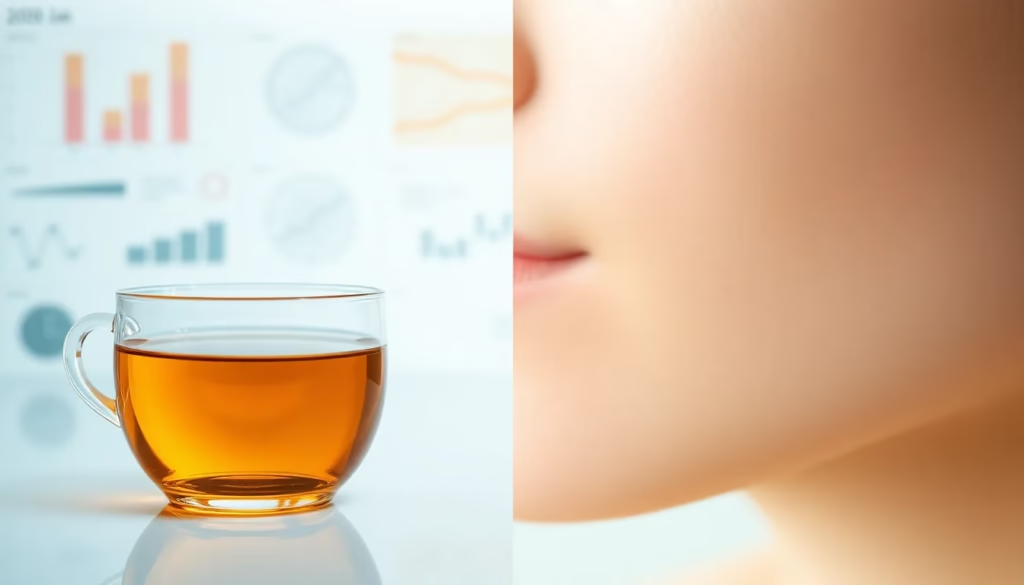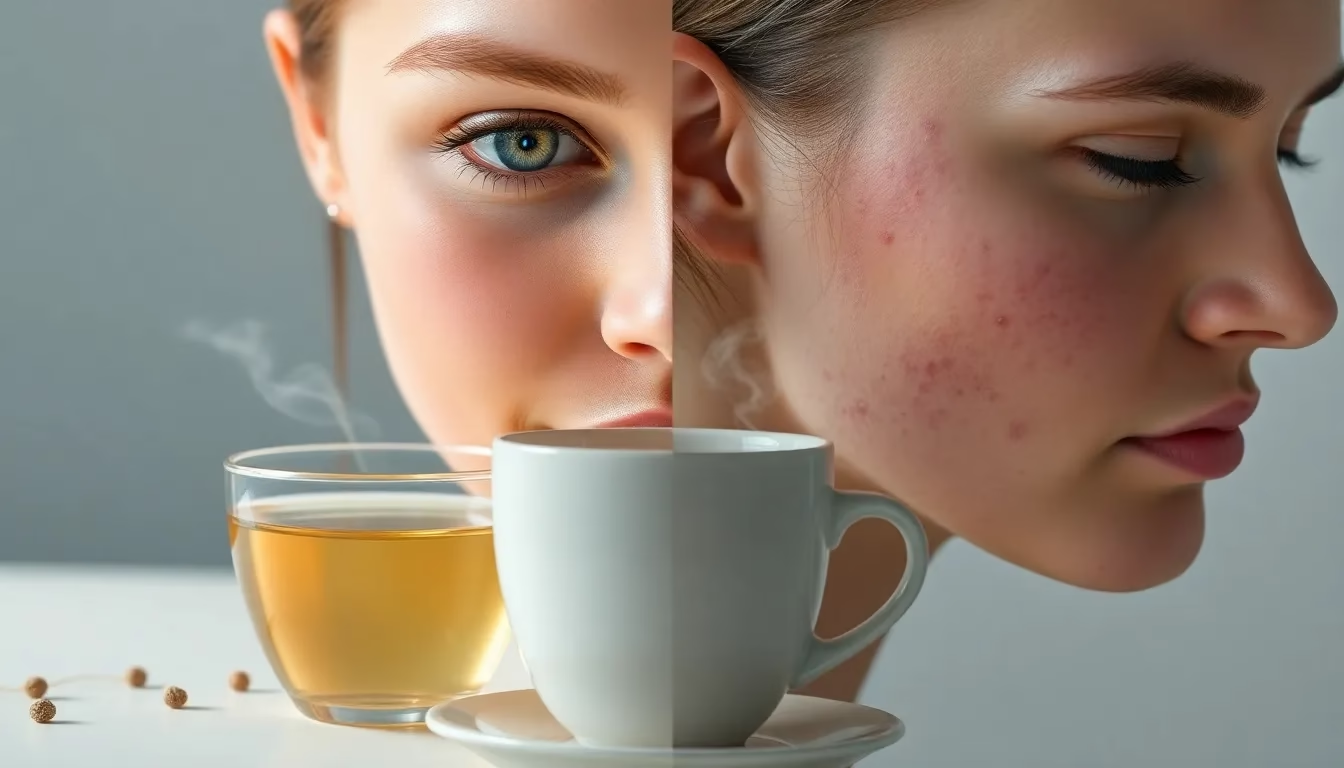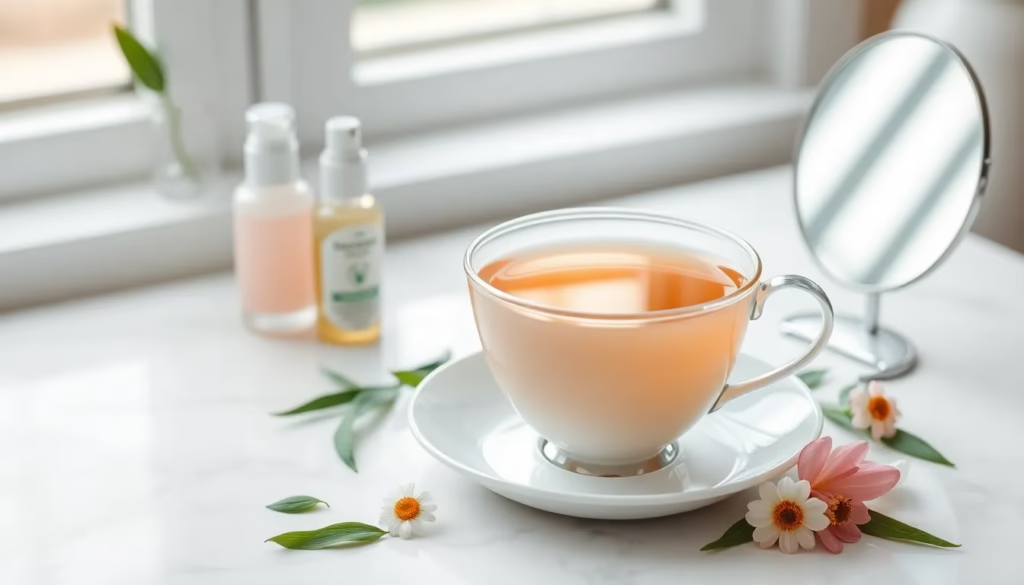
Introduction to Decaf Tea and Skin Health
Have you ever wondered about the hidden impacts of your favorite decaffeinated beverage on your skin? Acne can be a frustrating challenge, and understanding the potential triggers in your diet is crucial. This article dives deep into the intriguing relationship between decaf tea and skin health, unraveling the scientific insights that might surprise you. Whether you’re a tea enthusiast or someone struggling with persistent skin issues, you’ll discover valuable information about how your beverage choices could be affecting your complexion.
Table of Contents
What is Decaf Tea?
Decaf tea is a popular alternative for those seeking to reduce caffeine intake while enjoying their favorite brew. Unlike regular tea, decaffeinated tea undergoes a special process to remove most of its caffeine content. This means you can still savor the rich flavors and potential health benefits of tea without the stimulating effects of caffeine.
Different Decaffeination Methods
Tea manufacturers use several methods to decaffeinate tea, each with unique characteristics. The primary decaffeination techniques include:
- Carbon Dioxide (CO2) Method: A natural process using pressurized carbon dioxide to extract caffeine
- Ethyl Acetate Method: Uses a chemical solvent derived from natural sources
- Water Processing: A chemical-free approach that relies on water to remove caffeine
Each method aims to preserve the tea’s original flavor and nutritional properties while reducing caffeine content.
Composition of Decaffeinated Tea
The composition of decaffeinated tea remains largely similar to regular tea, with some subtle differences. While the caffeine is removed, key components like antioxidants, polyphenols, and minerals are typically retained. However, the decaffeination process can slightly alter the tea’s chemical profile, potentially impacting its overall nutritional value and potential effects on skin health.
Understanding Acne: Basics and Triggers

When it comes to skin health, understanding acne is crucial. You might be surprised to learn that what you drink could potentially impact your skin’s appearance. Acne is more than just a surface-level concern – it’s a complex condition influenced by multiple factors that go far beyond simple skincare routines.
What Causes Acne?
Understanding acne’s root causes helps you develop a more targeted approach to skin management. Your skin’s health is a delicate balance of internal and external factors that can trigger breakouts.
Hormonal Factors
Hormones play a significant role in acne development. Fluctuations in testosterone, estrogen, and cortisol can directly influence sebum production, leading to increased likelihood of breakouts. These hormonal shifts can occur due to various reasons like stress, menstrual cycles, or underlying health conditions.
Dietary Influences
What you consume can dramatically affect your skin’s health.
Your diet is like a roadmap for your body’s internal processes, and certain foods can trigger inflammatory responses that manifest as acne.
Factors such as sugar intake, dairy consumption, and even caffeine can potentially contribute to skin inflammation.
Genetic Predisposition
Your genetic blueprint significantly influences your skin’s predisposition to acne. Some individuals are more likely to experience breakouts due to inherited traits that affect:
- Sebum production rates
- Skin cell turnover
- Inflammatory responses
- Hormone sensitivity
Understanding your genetic potential can help you develop more personalized skincare strategies.
Decaf Tea and Potential Skin Impact
When you’re battling acne, every beverage choice matters. Decaf tea might seem like a harmless alternative to caffeinated drinks, but could it be secretly impacting your skin health? Understanding the potential connection between decaffeinated tea and your complexion can help you make more informed choices about what you drink.

Chemical Components in Decaf Tea
Decaf tea contains a unique blend of chemical components that differ from regular tea. The decaffeination process removes caffeine but can potentially introduce other compounds that might affect your skin. Understanding these chemical nuances is crucial to determining how decaf tea could potentially influence acne development.
Antioxidants
Antioxidants are the unsung heroes of skin health!
In decaf tea, these powerful compounds can help protect your skin from oxidative stress. While the decaffeination process might reduce some antioxidant levels, you can still benefit from the remaining protective properties that support overall skin wellness.
Residual Chemicals from Decaffeination
The decaffeination process involves chemical solvents that might leave residual traces in your tea. These chemicals, such as methylene chloride or ethyl acetate, could potentially trigger skin irritation or inflammatory responses. Being aware of these residual chemicals can help you make more informed choices about your decaf tea consumption.
Potential Inflammatory Compounds
Some compounds in decaf tea might trigger inflammatory responses in your body. Tannins, even in reduced amounts, can potentially stimulate inflammation that may exacerbate acne. While not all decaf teas will cause the same reaction, understanding these potential inflammatory triggers can help you manage your skin health more effectively.
Scientific Research on Tea and Skin
When it comes to understanding the potential link between decaf tea and skin health, scientific research plays a crucial role. Researchers have been investigating how various beverages, including tea, might impact your skin’s condition. While the connection isn’t completely straightforward, emerging studies suggest that the components in tea – even when decaffeinated – could have subtle effects on your skin’s appearance and overall health.
Existing Studies on Tea and Acne
Existing studies on tea and acne reveal a complex relationship. Some research indicates that certain compounds in tea, such as polyphenols and antioxidants, might actually have anti-inflammatory properties that could potentially benefit your skin. However, the evidence remains mixed, and more comprehensive research is needed to definitively establish a direct connection between decaf tea consumption and acne development.
Research Limitations
The current scientific research on decaf tea and acne has notable research limitations. Many existing studies have small sample sizes, lack long-term follow-up, and don’t always control for other dietary and lifestyle factors that might influence skin health. These methodological challenges make it difficult to draw absolute conclusions about the relationship between decaffeinated tea and acne.
Conflicting Scientific Evidence
Scientific evidence surrounding decaf tea and acne remains conflicting and inconclusive. While some studies suggest potential skin benefits, others indicate minimal or no direct impact. This uncertainty stems from the complex interactions between diet, individual physiology, and skin conditions. Factors like genetics, overall diet, stress levels, and personal skincare routines can all play significant roles in acne development.
Expert Opinions
Dermatologists and nutrition experts offer nuanced perspectives on the tea-acne connection.
Most professionals agree that while decaf tea itself is unlikely to directly cause acne, individual responses can vary. They recommend focusing on a balanced diet, proper hydration, and personalized skincare routines. Some experts even suggest that the antioxidants in decaf tea might have potential protective effects for skin health.
Managing Skin Health While Enjoying Decaf Tea

When it comes to managing your skin health while enjoying decaf tea, understanding the potential impacts is crucial. Not all beverages are created equal, and decaffeinated tea can have subtle effects on your skin that you might not immediately recognize. While decaf tea is often considered a healthier alternative to caffeinated drinks, it’s essential to pay attention to how your body responds and maintain a holistic approach to skincare.
Dietary Recommendations
To support your skin health while enjoying decaf tea, consider these key dietary recommendations. Focus on nutrient-rich foods that promote clear skin, such as:
- Antioxidant-packed fruits and vegetables
- Omega-3 rich foods like salmon and chia seeds
- Hydrating foods with high water content
Balance is key in maintaining your skin’s natural glow.
Hydration and Skin Health
“Water is the essence of life and the foundation of healthy skin”
rings especially true when managing your skin’s hydration. Decaf tea can contribute to your daily fluid intake, but it shouldn’t be your only source of hydration. Aim to drink 8-10 glasses of water daily, complementing your decaf tea consumption to keep your skin plump, clear, and radiant.
Balancing Tea Consumption
Balancing your tea consumption requires mindful approach. While decaf tea is generally gentle, moderation is key. Try to limit your intake to 2-3 cups per day, and be aware of any additional ingredients that might trigger skin reactions. Pay attention to how your body responds and adjust your consumption accordingly.
Complementary Skin Care Strategies
Complementing your decaf tea routine with strategic skin care strategies can make a significant difference. Consider incorporating:
- Gentle, non-comedogenic cleansers
- Moisturizers with natural ingredients
- Regular exfoliation
- Stress-reduction techniques
These strategies work synergistically with your diet to promote clear, healthy skin.
Conclusion: Decaf Tea’s Role in Skin Condition
While decaf tea’s impact on acne isn’t straightforward, understanding your body’s unique response is crucial. Individual skin reactions can vary widely, making it essential to pay attention to how your own skin responds to decaffeinated beverages. By carefully monitoring your skin’s condition and consulting with a dermatologist, you can make informed decisions about your diet and skincare routine.
Key Takeaways
Key takeaways about decaf tea and skin health include:
- Individual skin responses differ
- Potential inflammatory triggers exist
- Monitoring personal skin reactions is critical
- Consult healthcare professionals for personalized advice
Personal Variation in Skin Response
Your skin is as unique as your fingerprint, and what triggers acne for one person might be completely harmless for another.
Some individuals may experience skin irritation from decaf tea’s ingredients, while others might see no adverse effects. Factors like genetic predisposition, overall diet, and individual sensitivities play significant roles in how your skin responds to decaffeinated beverages.
Importance of Individual Monitoring
Tracking your skin’s response to decaf tea is crucial. Consider keeping a detailed skin journal that logs:
- Daily decaf tea consumption
- Skin condition changes
- Other dietary factors
- Stress levels
This personalized monitoring can help you understand your unique skin triggers and make informed health decisions.
